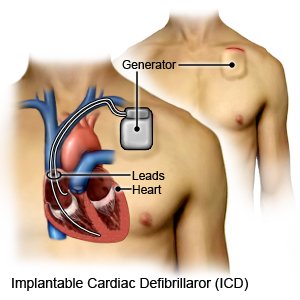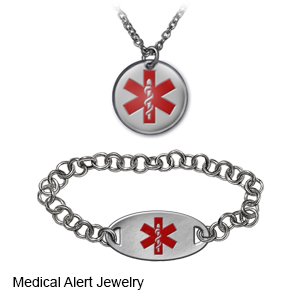Decision Aid for Implantable Cardioverter Defibrillator (ICD)
Medically reviewed by Drugs.com. Last updated on Aug 4, 2025.
What do I need to know about an implantable cardioverter defibrillator (ICD)?
An ICD is a small device that monitors your heart rate and rhythm. It is placed inside your chest or in the left chest area below your armpit. An ICD can give a shock to your heart to make it start beating again. It can also make your heartbeat faster or slower.
 |
How does an ICD work?
- A lead will be placed into a vein near your collarbone or neck and guided into your heart. You may have multiple leads placed into your heart. The other end of the leads are attached to the generator and placed in a pocket under your skin. This pocket is usually in the shoulder area. One type of ICD uses a lead that is tunneled from the left side of your chest over and on top of your breastbone. This type of ICD does not use wires placed in the vein or heart.
- The generator has a metal shell with a battery and a small computer. The computer will monitor your heart rate and rhythm. If the computer senses an irregular heartbeat, it will send electricity from the generator through the leads to your heart. These electrical shocks will make your heart beat normally.
What may make me a good candidate for an ICD?
- You have a life-threatening arrhythmia. You may have an irregular, fast, or slow heart rate. Some arrhythmias may cause your heart to stop beating suddenly.
- You are at high risk for certain heart problems. Examples include a heart attack, cardiomyopathy, electrolyte imbalance, or congenital heart disease. A family history of heart disease also increases your risk.
What are the benefits of an ICD?
- An ICD can lower your risk for a life-threatening arrhythmia. You are less likely to die suddenly from an arrhythmia because the ICD will shock your heart back into a normal rhythm. The device also records your heart rhythm. Your healthcare provider can use the record to check that the ICD is working to prevent an arrhythmia.
- An ICD can be turned off without surgery. The ICD can stay in place even if you have it turned off. Some devices will allow you to keep the pacemaker function but have the defibrillator turned off.
- You will not need to rely on someone to help you if you have an arrhythmia. The device will automatically give your heart a shock if needed. No one will need to give you CPR or use an external defibrillator. The ICD will be ready at all times, even when you are alone.
Related medications
What are the risks or drawbacks of an ICD?
- Surgery may cause some health problems. You may develop an infection from surgery. The leads could poke a hole in your heart, lung, or vein. Your lung may collapse, or your heart muscle may be torn. The leads may also cause arrhythmias when they are placed.
- The risk for bleeding is increased. You may bleed more than expected during surgery to place the ICD. Blood may collect in the pocket where the generator is placed and cause pain or an infection. You may also have bleeding around your heart. Blood may leak through the valve where your ICD lead was placed.
- The ICD may not work as needed. Your ICD may not shock your heart when needed. Your ICD may also shock more often than it should. You may develop new or worsening anxiety or depression after being shocked.
- The ICD may cause some health problems. You may develop an infection from the ICD. The device may fail to work properly, or it may erode. The ICD may have to be removed if it erodes. The leads may disconnect or break, and you may need another procedure to fix them. The battery may wear out sooner than expected and need to be replaced.
- An ICD will not improve heart failure. The device is only designed to stop an arrhythmia.
What do I need to know about ICD safety?
- You will not be able to lift anything heavy for several days after the ICD is implanted. You will also need to limit the use of your arm closest to the ICD. You may be told to place your arm in a sling to keep it from moving. Someone may need to help you around the house during this time.
- You will need to have medical alert identification. Identification may be jewelry or a card that says you have an ICD.

- You will need to stay away from magnets or machines with electric fields. These can interfere with how your ICD works. You will get specific safety information based on the type of ICD you have. You will need to keep cell phones and headphones away from your ICD. General examples of machines to avoid include car engines, welding machines, and electronic body fat scales. You may also need to avoid electrolysis, medical alert systems, or electric fences.
What questions should I ask my healthcare provider to help me make a decision about an ICD?
- Do the benefits of an ICD outweigh the risks for me?
- Would another type of treatment be better for my heart condition?
- Will an ICD improve my heart condition or prevent a heart attack?
- How will my daily life change? Will I have to stop doing certain activities I enjoy, such as driving, traveling, or playing sports?
- Does my age or sex affect how the ICD works?
- Will an ICD affect my health or my unborn baby's health if I become pregnant?
- How long does the battery last? Will the battery or the ICD need to be replaced?
- Does it hurt to have an ICD shock? Can I do anything to prevent shocks that are not necessary?
- How often will I need to have follow-up visits?
Where can I find support and more information about an ICD?
- American Heart Association
7272 Greenville Avenue
Dallas , TX 75231-4596
Phone: 1- 800 - 242-8721
Web Address: http://www.heart.org
Care Agreement
You have the right to help plan your care. Learn about your health condition and how it may be treated. Discuss treatment options with your healthcare providers to decide what care you want to receive. You always have the right to refuse treatment. The above information is an educational aid only. It is not intended as medical advice for individual conditions or treatments. Talk to your doctor, nurse or pharmacist before following any medical regimen to see if it is safe and effective for you.© Copyright Merative 2025 Information is for End User's use only and may not be sold, redistributed or otherwise used for commercial purposes.
Further information
Always consult your healthcare provider to ensure the information displayed on this page applies to your personal circumstances.
